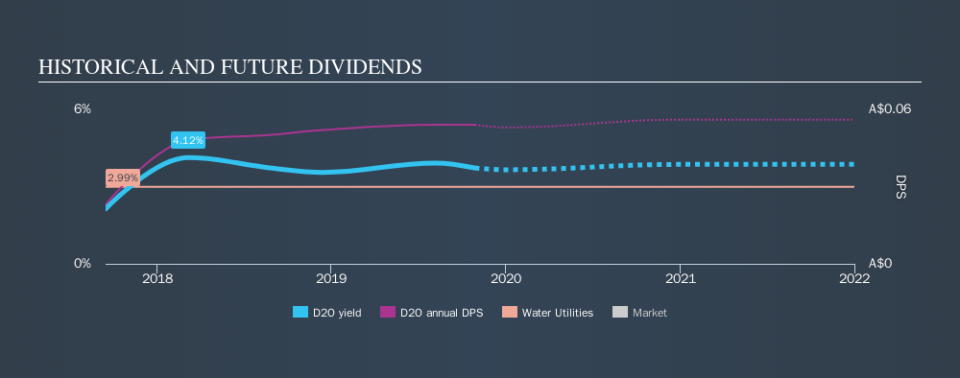How Does Duxton Water Limited (ASX:D2O) Fare As A Dividend Stock?

Dividend paying stocks like Duxton Water Limited (ASX:D2O) tend to be popular with investors, and for good reason - some research suggests a significant amount of all stock market returns come from reinvested dividends. If you are hoping to live on your dividends, it's important to be more stringent with your investments than the average punter. Regular readers know we like to apply the same approach to each dividend stock, and we hope you'll find our analysis useful.
In this case, Duxton Water pays a decent-sized 3.7% dividend yield, and has been distributing cash to shareholders for the past two years. A 3.7% yield does look good. Could the short payment history hint at future dividend growth? When buying stocks for their dividends, you should always run through the checks below, to see if the dividend looks sustainable.
Click the interactive chart for our full dividend analysis
Payout ratios
Companies (usually) pay dividends out of their earnings. If a company is paying more than it earns, the dividend might have to be cut. So we need to form a view on if a company's dividend is sustainable, relative to its net profit after tax. Duxton Water paid out 64% of its profit as dividends, over the trailing twelve month period. A payout ratio above 50% generally implies a business is reaching maturity, although it is still possible to reinvest in the business or increase the dividend over time.
In addition to comparing dividends against profits, we should inspect whether the company generated enough cash to pay its dividend. Last year, Duxton Water paid a dividend while reporting negative free cash flow. While there may be an explanation, we think this behaviour is generally not sustainable.
Remember, you can always get a snapshot of Duxton Water's latest financial position, by checking our visualisation of its financial health.
Dividend Volatility
One of the major risks of relying on dividend income, is the potential for a company to struggle financially and cut its dividend. Not only is your income cut, but the value of your investment declines as well - nasty. The dividend has not fluctuated much, but with a relatively short payment history, we can't be sure this is sustainable across a full market cycle. During the past two-year period, the first annual payment was AU$0.023 in 2017, compared to AU$0.054 last year. This works out to be a compound annual growth rate (CAGR) of approximately 53% a year over that time.
The dividend has been growing pretty quickly, which could be enough to get us interested even though the dividend history is relatively short. Further research may be warranted.
Dividend Growth Potential
Dividend payments have been consistent over the past few years, but we should always check if earnings per share (EPS) are growing, as this will help maintain the purchasing power of the dividend. Duxton Water's earnings per share are up 154% on last year. We're glad to see EPS up on last year, but we're conscious that growth rates typically slow as companies increase in size. With recent, rapid earnings per share growth and a payout ratio of 64%, this business looks like an interesting prospect if earnings are reinvested effectively. We do note though, one year is too short a time to be drawing strong conclusions about a company's future prospects.
We'd also point out that Duxton Water issued a meaningful number of new shares in the past year. Regularly issuing new shares can be detrimental - it's hard to grow dividends per share when new shares are regularly being created.
Conclusion
When we look at a dividend stock, we need to form a judgement on whether the dividend will grow, if the company is able to maintain it in a wide range of economic circumstances, and if the dividend payout is sustainable. Duxton Water gets a pass on its dividend payout ratio, but it paid out virtually all of its cash flow as dividends. This may just be a one-off, but we'd keep an eye on this. Next, earnings growth has been good, but unfortunately the company has not been paying dividends as long as we'd like. Ultimately, Duxton Water comes up short on our dividend analysis. It's not that we think it is a bad company - just that there are likely more appealing dividend prospects out there on this analysis.
You can also discover whether shareholders are aligned with insider interests by checking our visualisation of insider shareholdings and trades in Duxton Water stock.
If you are a dividend investor, you might also want to look at our curated list of dividend stocks yielding above 3%.
We aim to bring you long-term focused research analysis driven by fundamental data. Note that our analysis may not factor in the latest price-sensitive company announcements or qualitative material.
If you spot an error that warrants correction, please contact the editor at editorial-team@simplywallst.com. This article by Simply Wall St is general in nature. It does not constitute a recommendation to buy or sell any stock, and does not take account of your objectives, or your financial situation. Simply Wall St has no position in the stocks mentioned. Thank you for reading.

 Yahoo Finance
Yahoo Finance 
